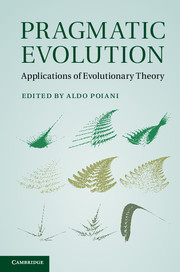Book contents
- Frontmatter
- Contents
- Contributors
- Acknowledgements
- Preface
- Introduction
- Part I Evolution, Ecology and Conservation
- Part II Evolution and Food Production
- Part III Evolution and Medicine
- Part IV Evolution and Psychology
- Part V Evolution and Computing
- Part VI Evolution and Society
- 14 Evolutionary arguments against the de facto re-pathologising of homosexuality
- 15 Teaching evolution and the nature of science
- 16 Evolutionary ideologies
- 17 Can Darwinism offer existential reassurance at times of personal or social crisis?
- Index
- Plate Section
- References
17 - Can Darwinism offer existential reassurance at times of personal or social crisis?
from Part VI - Evolution and Society
Published online by Cambridge University Press: 05 April 2012
- Frontmatter
- Contents
- Contributors
- Acknowledgements
- Preface
- Introduction
- Part I Evolution, Ecology and Conservation
- Part II Evolution and Food Production
- Part III Evolution and Medicine
- Part IV Evolution and Psychology
- Part V Evolution and Computing
- Part VI Evolution and Society
- 14 Evolutionary arguments against the de facto re-pathologising of homosexuality
- 15 Teaching evolution and the nature of science
- 16 Evolutionary ideologies
- 17 Can Darwinism offer existential reassurance at times of personal or social crisis?
- Index
- Plate Section
- References
Summary
Really, when you think about it, my title asks a bit of a daft question. Your daughter comes home and says she is going to become a Jehovah's Witness. Do you reach for The Origin of Species for guidance? Some nasty anonymous academic wrote a critical letter and so you fail to get tenure. Descent of Man, anyone? Sarah Palin gets elected President of the USA. How about a quick dip into the Voyage of the Beagle? Obviously when you put things that way, Darwinism is about the last thing you would turn to for existential reassurance (whatever that might be) at times of personal or social crisis.
On being human
So let us go at the question in another way. What would you turn to for reassurance at times of crisis? I take it that by adding the qualifier ‘existential’ we are ruling out the bottle, comforting though that may be. Although I don't think we should be too prissy or professorial about this sort of thing. If someone says that when things go wrong they go for a massage and a manicure, that seems to me a pretty good idea. It may not solve things as such, but it may well help you to relax and be better able to deal with a crisis. I remember many years ago when I was an undergraduate and very unhappy in the course of studies I had chosen, I found that listening to Mozart was a terrific way to stay on keel.
- Type
- Chapter
- Information
- Pragmatic EvolutionApplications of Evolutionary Theory, pp. 313 - 325Publisher: Cambridge University PressPrint publication year: 2011



